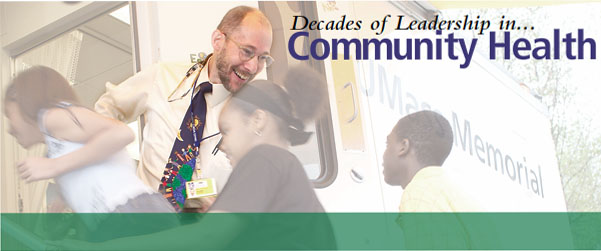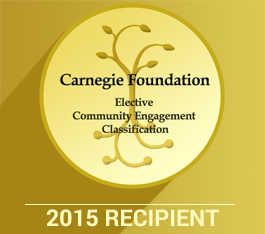
Background and philosophy
The Department of Family Medicine and Community Health promotes the clinical perspective of the community-oriented family physician, focused on individual patient care with a broader public health imperative. We strive to advance the wellness of underserved populations and communities in Worcester County and the Commonwealth.
As one of the University’s founding departments, the Department of Family Medicine and Community Health intentionally distinguishes—but links—medicine and community health. This is predicated on the knowledge that simply producing more physicians and clinics as well as diagnostic and treatment advances will not be sufficient to alleviate the major health problems in our communities. The greatest gains in health status will come from what people are able to do for themselves, individually as well as collectively, on a daily basis. Community health is predicated upon concepts of collective activity and the societal determinants of health.
The Department provides opportunities for students, residents, fellows, and faculty to partner with communities to assess and intervene on the broad determinants of health. Our intent is to ensure that, as we treat the symptoms of illness, we treat the causative factors as well. In the words of Dr. Rudolph Virchow, a renown 19th century German physician who is viewed as the principal architect of the foundations of scientific medicine, “Medical education does not exist to provide students [and faculty] with a way of making a living, but to ensure the health of the community.”
To advance the Community Health agenda, the Department has continued its history of developing training programs, and a wide array of partnerships based in the community as well as within the four walls of UMass Chan Medical School and UMass Memorial Health. The department serves as the focus of activities in population-based medicine and health as well as the public health system, prevention, and the role of physicians in improving the public’s health and wellness. This is meant to address issues as far ranging as behavioral health and social inequity, urban and rural health, underserved or poorly served, and populations that are often persecuted including the justice-involved, veterans, and disabled. We aim to abide by the sentiment of Paul Farmer: Medicine should be viewed as social justice work in a world that is so sick and so riven by inequities.
History
Family medicine and community health have been present since the beginning of UMass Chan, then known as UMass Medical School. For the FM Residency 30th anniversary, the department funded Dr. Haley to work with medical historian Ellen More in the Office of Medical Archives at the Lamar Soutter Library to research, write and publish a deep history of the impact of our Family Medicine residency programs on the growth of the field. Oral history interviews were conducted with faculty and learners from the first classes and compiled into the digital exhibit The People’s Medicine Comes to Massachusetts. The Department of Family and Community Medicine at UMass became the Department of Family Medicine and Community Health in 1998 under the leadership of chair Daniel Lasser MD. The role of Vice Chair of Community Health was established in 2006 with Dr. Warren Ferguson being selected as the first Vice Chair.
Strategic Goals
Goal: The Department will distinguish itself and be recognized nationally for integrating community health into family medicine practice, training, and scholarship.
Objective 1: We will serve as an academic partner with community agencies and public health entities in the development of community-responsive services to improve health equity and reduce health care disparities.
Strategies:
· 1.1 We will work with practices to provide measures of health outcomes to our practices and our partners.
· 1.2 We will work with UMass Memorial Health Care and UMass Chan Medical School to collaborate with central Massachusetts health departments, strengthening efforts to improve the health of central Massachusetts communities.
· 1.3 We will work in true partnership with the community to create healthy communities.
Objective 2: We will integrate training in population health concepts and the application of community health strategies within clinical practice as we create patient-centered medical homes.
Strategies:
· 2.1 We will develop web-based practice tools to disseminate existing population health data and outcomes within the communities where we train and practice.
· 2.2 We will strengthen community health training along the continuum of education from pre-doctoral to faculty development, with particular emphasis on service-learning, advocacy and community engagement.
· 2.3 We will expand global health initiatives and training, with emphasis on care to populations, cultural immersion and language training.
Objective 3: We will serve as an academic partner for ForHealth Consulting to establish and evaluate innovative and sustainable models of health care for diverse and vulnerable populations.
Strategies:
· 3.1 We will work collaboratively with ForHealth Consulting and other departments to orient, engage, collaborate and mentor with faculty across disciplines who concern themselves with the health of populations.
· 3.2 We will develop an expanded academic relationship with community health centers in conjunction with the Massachusetts League of Community Health Centers.
· 3.3 We will partner with the MassAHEC Network, Massachusetts Department of Public Health, and the Massachusetts League of Community Health Centers to obtain, collect, and analyze data related to the Commonwealth’s clinician workforce.
· 3.4 In conjunction with ForHealth Consulting, we will develop and host an academic consortium for correctional health.

